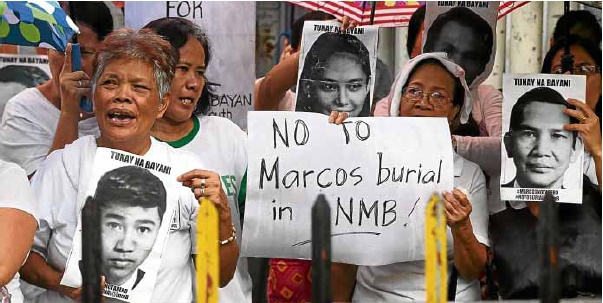
Martial law victims and human rights activists picket the Supreme Court to make a final appeal to
the justices to vote against the burial of late dictator Ferdinand Marcos at Libingan ng mga
Bayani in Taguig City. —MARIANNE BERMUDEZ
Associate Justice Marvic Leonen said the late dictator Ferdinand Marcos was “no hero” and that to bury his remains at the Libingan ng mga Bayani would be “illegal.”
In his dissenting opinion on allowing Marcos’ burial at the heroes’ cemetery, Leonen said the interment would “contribute to the impunity against human rights abuses and the plunder of our public trust.”
READ: SC: ‘No grave abuse of discretion’ by Duterte on Marcos burial
Here’s a summary of Leonen’s opinion as released by the Supreme Court public information office:
Associate Justice Marvic M.V.F. Leonen started his dissent, thus:
“Under our constitutional order, Presidents, unlike kings, earn their honors. As public servants, their position in itself should not be the basis to glorify them. Neither will their place in history be determined by a successor President. Only the sovereign Filipino People deserve to determine a President’s place in history.
Given the present state of our Constitution, our laws, and our jurisprudence, it is illegal for the remains of Ferdinand E. Marcos to be interred at the Libingan ng mga Bayani. The Filipino people do not deserve such a symbolism.”
Given the present state of our Constitution, our laws, and our jurisprudence, it is illegal for the remains of Ferdinand E. Marcos to be interred at the Libingan ng mga Bayani. The Filipino people do not deserve such a symbolism.
Justice Leonen then argued that “Marcos is no hero. He was not even an exemplary public officer. He is not worthy of emulation and inspiration by those who suffer poverty as a result of the opportunity lost during his administration, by those who continue to suffer the trauma of the violations to the human dignity of their persons and of their family. He is certainly not worthy of emulation and inspiration by those who do public service, including the lawyers, judges, and justices who simply want to do what is right, protect others, and conscientiously and diligently protect public funds entrusted to them.”
[puppquote] Marcos is no hero. He was not even an exemplary public officer. He is not worthy of emulation and inspiration by those who suffer poverty as a result of the opportunity lost during his administration, by those who continue to suffer the trauma of the violations to the human dignity of their persons and of their family.[/pullquote]
His dissent focused on six points, thus:
- The General Orders which were the basis for the issuance of the questioned orders of public respondents are invalid because they violate RA 289.
- Assuming without accepting that AFP Regulations were valid when issued, the verbal orders of the President, the Memorandum of the Secretary of National Defense, and the orders of respondent Enriquez all violate the requirement in RA 289, section 1 that those buried must have led lives worthy of “inspiration and emulation.”
- Assuming without conceding that the AFP regulations were valid when issued, the public respondents gravely abused their discretion when they failed to show, in view of the findings of the National Historical Commission of the Philippines, that they had sufficiently determined that there was factual basis to believe that the burial of Marcos’s remains would be consistent with RA 289 and the various proclamations relevant to the LNMB.
- The President’s verbal orders, the memorandum of the Secretary of National Defense, and the orders of respondent Enriquez were issued with grave abuse of discretion because they violate RA 10368.
- The President’s verbal orders, the memorandum of the Secretary of National Defense, and the orders of respondent Enriquez cannot be justified under the provisions of the Revised Administrative Code because there is no public purpose for the interment of Marcos’s remains at LNMB.
- The actions of public respondents are contrary to the oath of office of the President because they encourage impunity, which is the result of rewarding the person who presided over human rights violations and who personally participated in the plunder of the public treasury.
Ending his dissent, Justice Leonen writes:
“We forget the lessons of the past when we allow abuse to hold sway over the lives of those who are unrelated to us. Silence, in the face of abuse, is complicity.
The burial of Ferdinand E. Marcos at the Libingan ng mga Bayani is not an act of national healing. It is an effort to forget out collective shame, to bury our inaction for many years. It is to contribute to the impunity against human rights abuses and the plunder of our public trust.
To deny these petitions is to participate in the effort to create myth at the expense of history.”
Ferdinand E. Marcos is no hero. His remains, by law, cannot be transferred to the Libingan ng mga Bayani.”
The high tribunal voted 9-5 with one abstention to dismiss the petition filed by anti-Marcos groups and personalities to block President Rodrigo Duterte’s order. CDG